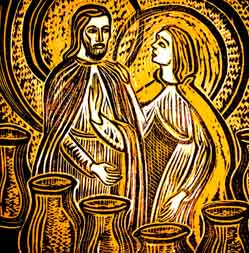And Now for Something Completely Different . . .
“Everyone serves the good wine first,
and then when people have drunk freely, an inferior one;
but you have kept the good wine until now.”
and then when people have drunk freely, an inferior one;
but you have kept the good wine until now.”
One
thing that strikes me as odd in this parable, aside from turning water into
wine, is that Jesus associates new wine with superior wine. Everyone knows newer wine is inferior to wine
that has had time to ferment and age.
Why, then, is this “new wine” Jesus has transformed from water superior?
The
account is that the head server tasted the newly created wine, not knowing its
source, and declared it superior. Had he
been told this wine was just created a few minutes ago, he would have probably
not even tasted it, confident in its inferior quality.
As
Jesus’ first recorded “sign”, which is the terminology John uses rather than
“miracle”, its significance lies in its link to Jesus’ passion. In verse 4, Jesus responds rather strangely
to Mary’s revelation that the wine has run out with “Woman, how does your
concern affect me? My hour has not yet come.”
Jesus implies that his only
concern is with the fulfillment of his mission, and the miracle becomes a sign
of this mission of transformation.
At
the level of symbol, the water—the fundamental association being humanity—is
transformed into wine, the symbol associated with divinity. In the Mass, the priest says as he pours the
water into the wine: “By the mystery of this water and wine, may we come to
share the divinity of Christ, who humbled himself to share in our
humanity”. This symbolic act is charged
with Christ’s mission to “divinize” humanity, to use an Orthodox term. The forming of God into our human existence
wasn’t so much the humanization of God, but the divinization of humanity; God
didn’t need to experience us, we needed to experience God.
This
“in-breaking” of divinity into our world as God who martyred Himself for His
people out of love is the great sign and pathway to our divinization. If we wish to follow Christ, we must be caught
up in a life of sacrificial love. In a
world full of martyrs who blow themselves up for a political cause masked by
pseudo-religion hobbled by hatred, God’s martyrdom was borne of perfect love
that sought not the destruction of sinners but their salvation.
The
“old wine” now becomes the wine of hatred of the other--- whatever the
label: sinner, infidel, terrorist. The
“new wine” is the transformation of this self-seeking love of tribe, of
country, of religion over that of neighbor to be transformed into a love that
seeks out the other in an act of selfless love.
Jesus’ miracle at the wedding resonates with Isaiah’s imagery of God’s
people as the bride, God as supreme lover---the promise that “As a young man
marries a virgin, your Builder shall marry you; and as a bridegroom rejoices in
his bride so shall your God rejoice in you.”
The great revelation of the Gospel
is the good news that God’s love is the counter-intuitive truth that the new wine
is superior to the old. Behold, God is
doing something new!

No comments:
Post a Comment